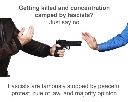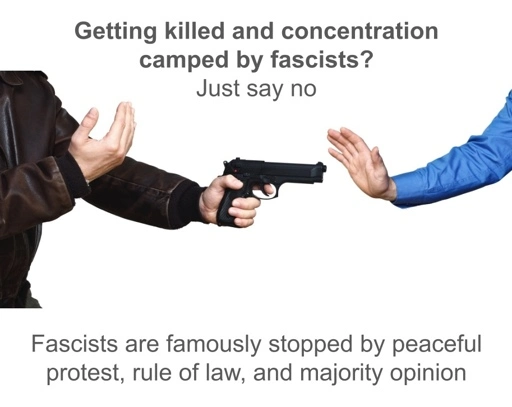Bringing a "please don't" to a gun fight
Bringing a "please don't" to a gun fight


Bringing a "please don't" to a gun fight


You're viewing a single thread.
Just gonna link this tired old post over here
I keep seeing that study:
From what I can tell, it works backwards from a conclusion the authors already held. They excluded peaceful events that weren’t “noteworthy,” labeled protests as violent if police instigated violence, and narrowly defined success windows for violent movements while crediting peaceful ones for regime collapses that likely would have happened anyway.
Since the study was published, a wave of high-profile failures—the Arab Spring, Occupy Wall Street, BLM, etc.—has shown that the effectiveness of nonviolence has drastically diminished. Even the study’s lead author has acknowledged that modern authoritarian regimes now use digital surveillance and media control to neutralize peaceful dissent.
The study also ignores the reality that mixed-strategy movements—where one faction remains peaceful while another escalates—are often more successful, yet it frames nonviolence as the only legitimate or effective tactic.
Thank you for posting what I've wanted to convey about that study. Mixed strategy movements are the ones with true success. The civil rights movement did not succeed on MLK's back alone. Malcolm X and the Black Panthers becoming militarized is why the U.S. government started thinking about extending an olive branch. Well that and the RIOTS after Dr. MLK was assassinated by the FBI. And those riots were not "peaceful".
Thanks for the link.
A major issue with your criticism is you don't directly cite or quote anything, so we can't readily verify your claims.
A more significant issue is that we have a systematic research study with a clear design & methodology to support its conclusion. Where's the superior study to support your conclusions?
If I had to choose, then I think I'd stick with the conclusions backed by systematic research.
From what I can tell, it works backwards from a conclusion the authors already held.
Held before the study? Do you think people can only write their thoughts chronologically?
They excluded peaceful events that weren’t “noteworthy,”
Where? ::: spoiler The article you linked states they analyzed resistance campaigns, not events.
Our research goals are threefold: first, to determine whether nonviolent or violent resistance campaigns have a better record of achieving stated objectives
We define a resistance campaign as a series of observable, continuous tactics in pursuit of a political objective. A campaign can last anywhere from days to years. Campaigns have discernible leadership and often have names, distin-guishing them from random riots or spontaneous mass acts.
By analyzing campaigns rather than individual events, we are able to make some general observations about campaigns that can be explored further through in-depth case studies. Moreover, resistance campaigns involve much more than just events; they involve planning, recruiting, training, intelligence, and other operations besides their most obvious disruptive activities. Using events asthe main unit of analysis ignores these other operations, whereas analyzing campaigns allows usto consider the broader spectrum of activities as a whole. :::
labeled protests as violent if police instigated violence
Where? To the contrary, there's a whole section about that backfiring against the regime opposing a nonviolent movement.
Second, whereas governments easily justify violent counterattacks against armed insurgents, regime violence against nonviolent movements is more likely to backfire against the regime.
How would they be able to make such claims if they label all such movements as violent?
narrowly defined success windows for violent movements while crediting peaceful ones for regime collapses that likely would have happened anyway
Where? ::: spoiler Success criteria and windows for both were the same.
The outcomes of these campaigns are identified as “success,” “limited success,” or “failure.” To be designated a “success,” the campaign must have mettwo criteria: (1) its stated objective occurred within a reasonable period of time (two years) from the end of the campaign; and (2) the campaign had to have a discernible effect on the outcome. A “limited success” occurs when a campaign obtained significant concessions (e.g., limited autonomy, local powersharing, or a nonelectoral leadership change in the case of dictatorship) although the stated objectives were not wholly achieved (i.e., territorial independence or regime change through free and fair elections). A campaign is coded a “failure” if it did not meet its objectives or did not obtain significant concessions. :::
has shown that the effectiveness of nonviolence has drastically diminished
Do you have a proper study to support that by the same standards/methodology?
Even the study’s lead author has acknowledged that modern authoritarian regimes now use digital surveillance and media control to neutralize peaceful dissent.
Where? How does that affect
Our findings show that major nonviolent campaigns have achieved success 53 percent of the time, compared with 26 percent for violent resistance campaigns.
or make violent campaigns any more effective?
The study also ignores the reality that mixed-strategy movements—where one faction remains peaceful while another escalates—are often more successful
Do you have studies as credible as this to support that conclusion?
it frames nonviolence as the only legitimate or effective tactic
Does it? The study seems to merely compare outcomes of resistance campaigns in an unopinionated fashion as stated in the design & methodology.
Your argument would improve with stronger support.
Throughout history, like 99% successful rebellion against authoritarianism has been violent.
Source: Historian.
The only successful non-violent over-throwing of an authoritarian occupation either had the leverage of violence, or brought attention to the issue by those who used violence :/
I sure don't have any qualms about nonviolence succeeding because the oppressors realize they don't want to see the violence.
I'd like that.
this is not the conversation ending truth-bomb some people make it out to be.
scholars have contested the selection methods and conclusions reached in that original survey/article. for example, several of the "successful" countries on their list have since regressed into dictatorships/unrest.
not trying to debate or be contrarian, but I think folks who lean heavily on the non-violence strategy should consider that the success of nonviolent moderate protest movements may have something to do with them being perceived as more palatable to the ruling class than the violent opposition alternatives. therefore, simply making violent alternatives widely known and believed to be credible threats, actually serves to push moderate people towards the less scary less radical faction of the movement.
I mean that's how the civil rights movement succeeded here in the US. I know we get a heavily sanitized version basically reduced to "I have a dream" but the Black Panthers and Malcolm X were extremely active and militarized. It was either deal with MLK's peace movement or deal with Malcolm X and the Black Panthers.
lol right? Yeah they ARE famous for that ACTUALLY